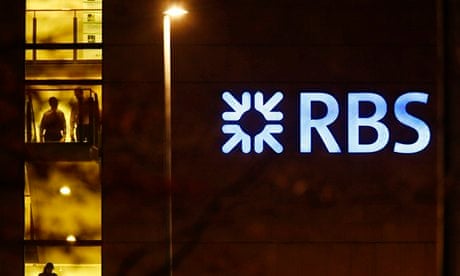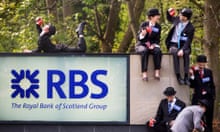Royal Bank of Scotland is facing a row over its pay policies after a fresh hit for legal bills and mis-selling scandals put the bailed-out bank on track to report up to £8bn in losses for 2013.
Even though its nine-strong top management team said they would waive any bonuses, given the scale of the losses, the bank gave the strongest indication yet it would sidestep the EU bonus cap by asking shareholders' permission to pay bonuses worth 200% of salaries – double the size of the restriction imposed by Brussels.
Chairman Sir Philip Hampton insisted RBS had to keep paying competitively. He spoke at a hastily convened conference call caused by an unscheduled trading statement in which the 81% taxpayer-owned bank revealed it would incur an extra £3bn of losses for conduct-related matters over the US sub-prime mortgage crisis and mis-selling of payment protection insurance and interest rate swaps.
The additional costs come on top of £4.5bn losses from the creation of a mini-bad bank inside RBS and, according to estimates, could drive the bank to losses of around £8bn by the time it reports full-year results at the end of next month.
If the loss is on that scale it would mean RBS has incurred more than £40bn of losses since its 2008 bailout – almost as much as the £45bn taxpayers pumped in to rescue it.
The move appears to push back any prospect of chancellor George Osborne selling off any of the taxpayers' stake, even as he prepares to press ahead with the sale of Lloyds Banking Group as soon as next month.
The extra £3bn includes £1.9bn for various claims and past conduct issues facing the bank – most likely the potential cost of a settlement over sub-prime mortgages in the US – plus £465m for PPI mis-selling, another £500m for interest rate swap mis-selling, and another unspecified £200m. The latest costs bring the total PPI bill to £3.1bn and swaps mis-selling to £1.3bn.
Ross McEwan, who took over as RBS chief executive on 1 October from Stephen Hester, had already said he would not take a bonus for 2013 and now the rest of his eight-strong executive committee will also forgo their multimillion-pound payments.
The New Zealander, promoted from running the retail bank after Hester's sudden departure, said the scale of the costs incurred from past mistakes had not been expected at the time of the bailout.
"This is about leadership. I know this team is not responsible for the past mistakes but we are the leaders running the company now and have to show we take accountability seriously," he said, in reference to the move to block bonuses for the top management team.
But the bank may face hurdles in its plans – still being finalised – over pay in light of the EU bonus cap that comes into effect for bonuses paid this time next year. The cap restricts bonuses for the most senior staff to 100% of salary, but can be lifted to 200% of salary if shareholders approve.
Hampton said: "We obviously need to be sensitive to our shareholding structure and the political and media issues around that, but the ability to pay competitively we think is fundamental to the prospect of getting to where we need to be."
Labour has already called on Osborne to use the state shareholding to stop such a request if it is made and UK Financial Investments, which looks after the taxpayer stake, is thought to be considering abstaining if it is put to the annual meeting in May.
Lord Oakeshott, the Liberal Democrats' former Treasury spokesman in the Lords, called any such bonus proposals "preposterous" and called on the government to nationalise the Edinburgh-based bank.
"Taxpayers are having to sign a never ending stream of blank cheques to cover disastrous long-term management at RBS while the bank's still failing to lend," Oakeshott said.
Andrew Tyrie, chairman of the Treasury select committee, stressed the need for the bank to lend to small business customers. "RBS is still paying a heavy price for past misconduct. So too are its customers and taxpayers. It is crucial for the recovery that lending, particularly to SMEs, is not constrained as a result," Tyrie said.
Payments of as much as £5.6m promised to Hester will not be affected.
McEwan said the losses related to a period at the time of its bailout when RBS was the biggest bank in the world. "The scale of the bad decisions during that period means that some problems are still just emerging. The good news is we are now a much stronger bank and can manage these costs while still supporting our customers," he said.
The unexpected statement came at 4pm following a board meeting and 30 minutes before the market closed, leaving the shares closed 2% lower at 332p – representing a £15bn loss on the taxpayers' stake.
Nathan Bostock, who has quit as finance director to join Santander, said there would be a "substantial loss" but would not be precise.
The announcement was made to coincide with a deadline by US regulators to file the results of one of its US arms.
Standard & Poor's said the bank's credit rating was unaffected but the key capital ratio will be among the lowest of its peers.



